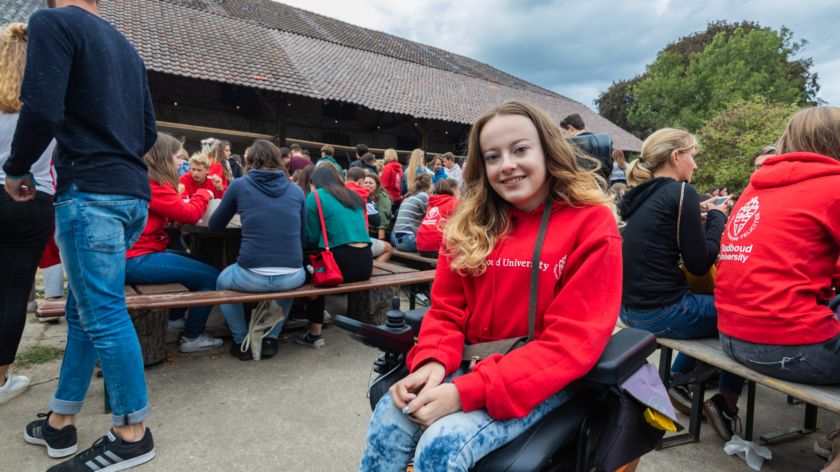How to survive the intro festival in a wheelchair
-
 Renée at the intro festival in Goch. Photo: Marjolein van Diejen
Renée at the intro festival in Goch. Photo: Marjolein van Diejen
Molecular life science student Renée and soon-to-be Physics and Astronomy student Paul take part in the intro festival. Both are dependent upon wheelchairs and encounter some problems. But even though it's not always easy, they are eager to participate. So they do.
‘A festival is obviously not an optimal environment’, says Renée, one of this year’s mentors. What the 19-year old molecular life science student means is everything from transportation to electricity — and especially rain and mud. She is participating sitting in an electric wheelchair. Something that, in combination with a festival, definitely needs some consideration.
Renée is not the only person on the festival location sitting in a wheelchair. Paul, a 17-year old soon-to-be Physics and Astronomy student came in a non-electric wheelchair. So far he hasn’t encountered any problems. His group came to Germany in a wheelchair-accessible city bus and although he can’t participate in all activities, he’s doing as much as possible.
So is Renée, who on the contrary of Paul already faced some difficulties. For her, regular transportation couldn’t be organised, so her mother had to drive her to the festival location. ‘If I wouldn’t have asked beforehand if the bus would be wheelchair accessible, I wouldn’t have known that it’s not. But you learn to ask the right questions after a while’, she says.
Muddy
But even with the right questions asked, things not always go as planned. The electricity needed to charge the wheelchair for example was, even after having email contact with the location beforehand, after arrival not available. And while the electricity problem could be solved after a two-hour search, the weather could become a bigger issue. Rain on Saturday followed by a muddy environment is a difficulty for anyone in a wheelchair. From getting stuck to slippery ramps — there are many things that can go wrong.
Experience
On the question what inspired her to become a mentor with all those possible problems, Renée answers: ‘My own orientation was such a positive experience that I wanted to take part on the organisational side’ — and so, with the help of some people, she does.
Surrounded by people is also Paul. And both, by that, enhance inclusion of disabled people. Not by presenting it as a theoretical concept, but by living it. That doesn’t make it easy, but increasingly normal — which is, in the end, a necessity of its progress.



